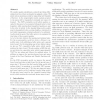Free Online Productivity Tools
i2Speak
i2Symbol
i2OCR
iTex2Img
iWeb2Print
iWeb2Shot
i2Type
iPdf2Split
iPdf2Merge
i2Bopomofo
i2Arabic
i2Style
i2Image
i2PDF
iLatex2Rtf
Sci2ools
SODA
2003
ACM
2003
ACM
Competitive queueing policies for QoS switches
We consider packet scheduling in a network providing differentiated services, where each packet is assigned a value. We study various queueing models for supporting QoS (Quality of Service). In the nonpreemptive model, packets accepted to the queue will be transmitted eventually and cannot be dropped. The FIFO preemptive model allows packets accepted to the queue to be preempted (dropped) prior to their departure, while ensuring that transmitted packets are sent in the order of arrival. In the bounded delay model, packets must be transmitted before a certain deadline, otherwise it is lost (while transmission ordering is allowed to be arbitrary). In all models the goal of the buffer policy is to maximize the total value of the accepted packets. Let α be the ratio between the maximal and minimal value. For the non-preemptive model we derive a Θ(log α) competitive ratio, both exhibiting a buffer policy and a general lower bound. For the interesting case of two distinct values, we g...
| Added | 01 Nov 2010 |
| Updated | 01 Nov 2010 |
| Type | Conference |
| Year | 2003 |
| Where | SODA |
| Authors | Nir Andelman, Yishay Mansour, An Zhu |
Comments (0)

